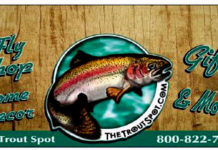If you are a veteran angler, you might have, at some point in your career, had a huge day on the water.
More than one, probably, if you’ve been around long enough.
I mean a day when you landed dozens or scores of bass or trout or bluegills. A time when you couldn’t keep the fish off the hook.
I’ve had those days, at times and places when the fish were more than willing or incredibly naïve, or there were just so many of them that it was impossible not to land a bunch. We’ve had 50 fish days with the smallmouths on several rivers, days when two or more of us stopped counting at 50 trout apiece on small, rarely-fished creeks in the Rockies, days when two hundred bluegills apiece came to hand at spawning time -so many, so easily, and so frequently that the whole enterprise became boring and sometimes turned out to be more work than fun.
Those are a testimony to my skills and those of my partners. Anyone capable of throwing and retrieving a bass lure or laying a fly on the water would have done as well. Mostly, we were in the right place at the right time.
And these are rare occurrences. I’ve had my blank days, too, plenty of them, and way more than I want to admit. I always say, I can catch the fish that want to be caught. Sometimes I can figure it all out, but, really, I’m the kind of angler who has to depend on stupid or reckless fish.
I suppose if you have had such days, you might have been tempted to keep more fish than the established creel limit. Maybe not. Remember, you are not required to keep every fish you are legally entitled to.
I love walleyes, perch and bluegills, and if I fish for them, I’m going to keep them. Maybe keep the limit, maybe not. When Ron Janowsky and I would go for bluegills down to Lake Moraine or Leland Ponds or Cazenovia Lake years ago, we’d often catch hundreds of fish throwing poppers. On the right day, it would be every single cast. No joke. We’d only keep those that stretched eight inches – that’s when bluegills start to show some meaty shoulders – and I never kept more than 20. I don’t know what the limit was then – there might not have been one; it’s 50 now — but as much as I loved eating those things, I didn’t want to clean too many. With walleyes, if I can catch my limit, I’m keeping them, because those things are like gold. Smallmouths? Not bad, but I don’t particularly care for them, so they are rarely kept.
I’ve killed perhaps a half-dozen trout in the last 40 or 50 years, having grown up in a fly fishing circle that frowns on the practice. However, I do not mind if you keep your limit.
This is not to suggest that my friends and I are more virtuous than the average person. Virtue is not the first word that comes to mind when I think of most of my friends. In fact, I sometimes wonder why I hang out with them, but, then, they probably wonder the same about me.
But … I don’t like rule breakers. I don’t like fish and game hogs. I don’t like greedy people.
All of the above was prompted by a recent Department of Environmental Conservation news release about patrols on Oneida Lake tributaries than generated more than 40 tickets for violations associated with the annual walleye spawning run. Environmental Conservation Officers conducted patrols on foot, in canoes, and by boat on the lake and Cowaselon, Chittenango, and Canaseraga creeks during April, prior to the opening of pike season. So, the violations weren’t necessarily about taking too many fish, although that likely did happen, and more so about taking them before the season began May 1.
Doesn’t matter. It’s about greedy fish hogs either way.
Walleyes ascend the creeks in great numbers during spawning, and are extremely vulnerable at that time. Poachers can sometimes take dozens of them with little trouble, and many take way more than their share, and, in these cases, out of season to boot.
So, I’m glad these people got nailed, and I hope they were heavily fined. However, I wonder, even if more than 40 tickets were issued, how many violations actually occurred. A lot more than 40, for sure.
So, why have seasons and creel limits anyway? The idea is to protect the resource and spread the wealth – maintain sustainable populations and provide continued fishing opportunities.
For example, if fisheries biologists determine that there are 1,000 fish in a lake and that 200 of them can be removed in a season without damaging the population for the next year, they will set a daily creel limit that aims at that number for the total take. And the creel limit also is aimed at spreading out the take, so the lucky angler who is there the day the fish go nuts doesn’t get to keep the 200 fish that fill the biologists’ goals.
That is an oversimplification, but it gives you the idea. Creel limits, ideally, protect the resource and spread the wealth. Fish hogs screw up that equation.
Some people think they deserve something, anything more than others, or believe they should be rewarded for their self-perceived cleverness, or have larcenous hearts and will take anything of value that isn’t nailed down, or are just greedy jerks.
Don’t be any of those things.
Write to John Pitarresi at 60 Pearl Street, New Hartford, N.Y. 13413 or jcpitarresi41@gmail.com or call him at 315-724-5266.
Credit: Source link































